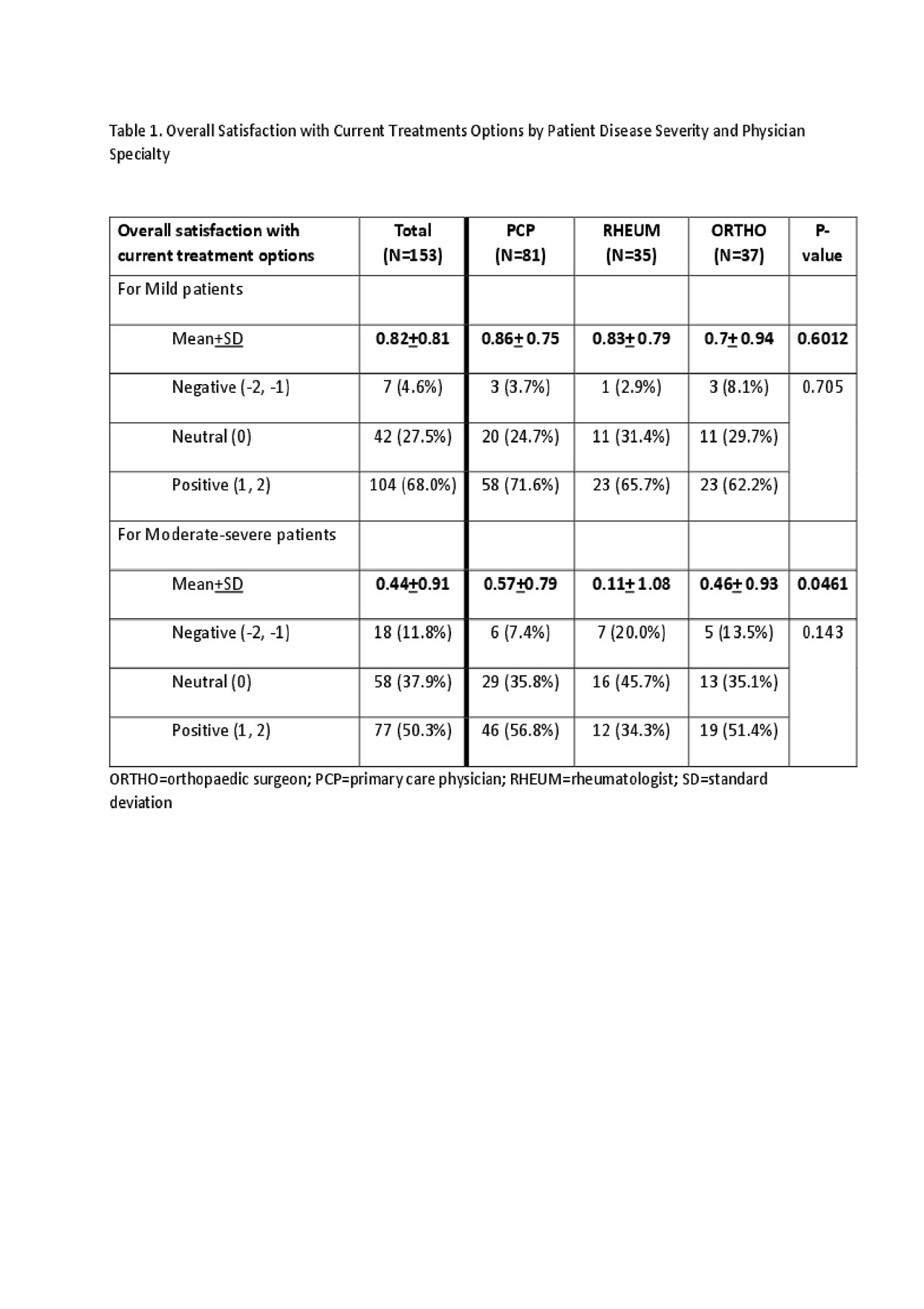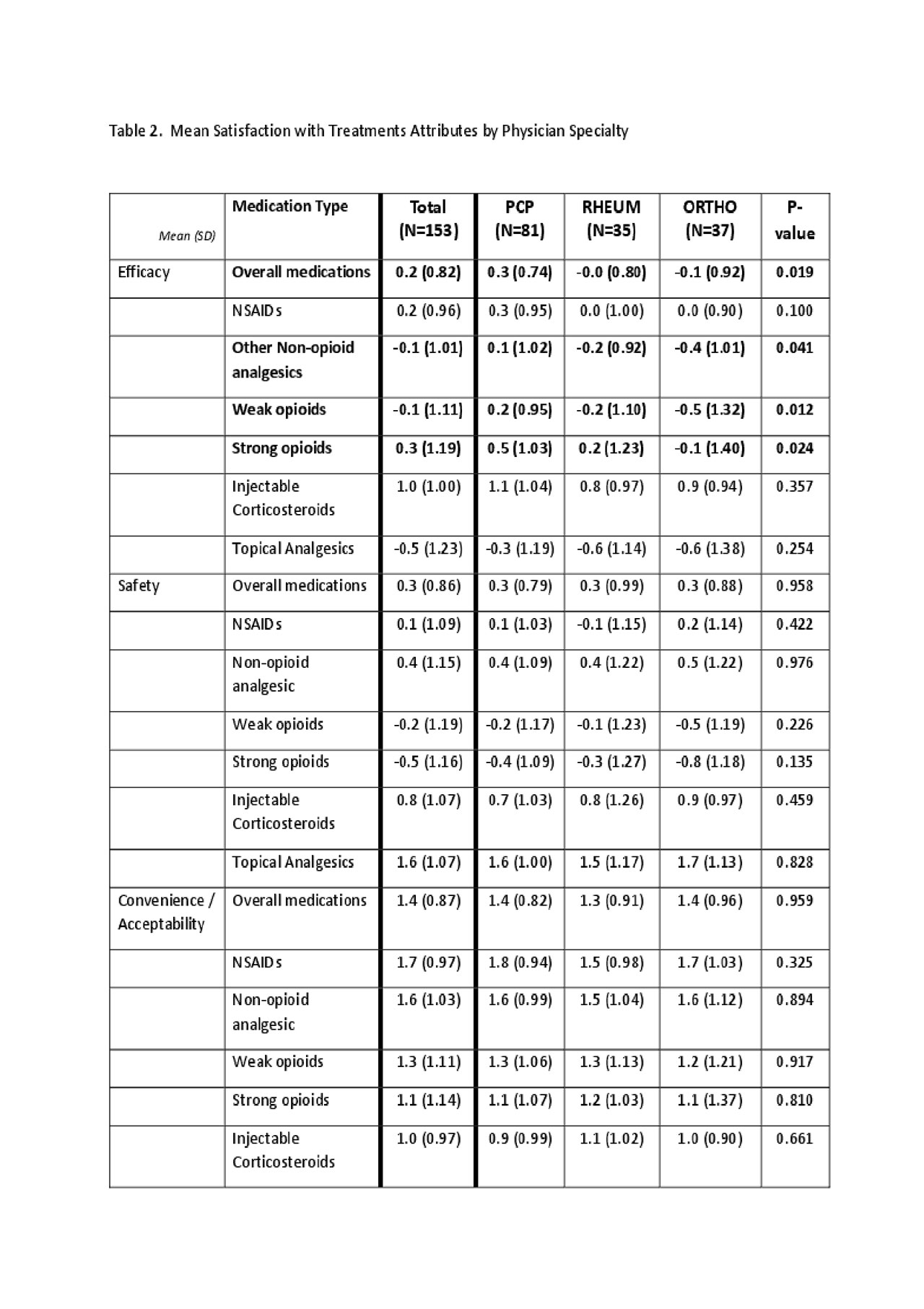Session Information
Date: Tuesday, November 12, 2019
Title: Patient Outcomes, Preferences, & Attitudes Poster II: Patient Preferences, Beliefs, & Experiences
Session Type: Poster Session (Tuesday)
Session Time: 9:00AM-11:00AM
Background/Purpose: To describe patterns of care and physician satisfaction with prescribed treatments for osteoarthritis (OA).
Methods: Data were collected from February-May 2017 using US Adelphi Disease Specific Programme, a cross-sectional survey of 81 (52.9%) primary care physicians (PCP), 35 (22.9%) rheumatologists (RHEUM), and 37 (24.2%) orthopedic surgeons (ORTHO). Specialties were compared based on reported use and satisfaction with prescribed treatments using Likert-type scales: -2 (not satisfied) to +2 (very satisfied) for overall satisfaction; and -3 (performs very badly) to 3 (performs very well) for drug class attributes of efficacy, safety, quality of life (QoL), costs, and convenience. Specialties were compared using Fisher-Freeman-Halton exact tests and analysis of variance tests.
Results: : Physicians were mostly male (72.5%), with private (84.7%) and office/outpatient (87.2%) practices and had been in practice over 15 years (77.8%). All specialty comparisons are listed as PCP, RHEUM, ORTHO, respectively. First-line treatment included predominantly lifestyle changes and NSAIDs (Figure 1), and rates for each treatment did not differ by specialty. Second and third-line medication use only differed by specialty for injectable corticosteroids and surgery, prescribed more frequently by ORTHOs. Affirmation from physicians that any guidelines were routinely followed differed by specialty (28.4%, 51.4%, 48.6%; p< 0.05). Slightly less than one-third of physicians had ever recommended cannabinoids (28.4% 28.6%, 27.0%). Among those physicians, the frequency of cannabinoid recommendations was reported as rare (60.4%), sometimes (34.9%), and frequent (4.7%). Physicians’ satisfaction across all medications was mostly positive for mild patients (71.6%, 65.7%, 62.2%), but lower for moderate to severe patients (56.8%, 34.3% 51.4%) with mean satisfaction rated lowest among RHEUMs (p< 0.05, Table 1). When assessing performance across all 5 drug attributes evaluated, efficacy, cost considerations, and QoL differed by specialty (all p< 0.05; Table 2). Efficacy rating for overall medications, opioids, and other non-opioid analgesics were rated highest by PCPs and lowest by ORTHOs. Cost considerations differed for injectable corticosteroids which were most favorable among RHEUMs, and QoL was rated lowest among ORTHOs for opioids. Ratings for each medication by safety and convenience were similar across specialties. Opioids had the lowest mean performance ratings for efficacy (weak only), safety, and QoL.
Conclusion: Few differences by physician specialty were found in reported rates of first, second, and third line use of therapies for OA. Physicians rated satisfaction with overall medications as positive when treating patients with mild OA, but ratings were lower for moderate to severe patients. Variability by specialty was most pronounced in the performance ratings for efficacy and QoL; most noteworthy, opioids were reported highest by PCPs and lowest by ORTHOs. These data indicate more similarities than differences in OA treatment among physician specialties despite potential variations in physician specialty training and populations served.
To cite this abstract in AMA style:
Schnitzer T, Robinson R, Viktrup L, Cappelleri J, Bushmakin A, Tive L, Mellor J, Williams N, Hubanova P, Jackson J. What Are the Prescribing Trends and Satisfaction Levels with Analgesics for Osteoarthritis as Reported by US Rheumatogists, Orthopaedic Surgeons, and Primary Care Physicians? [abstract]. Arthritis Rheumatol. 2019; 71 (suppl 10). https://acrabstracts.org/abstract/what-are-the-prescribing-trends-and-satisfaction-levels-with-analgesics-for-osteoarthritis-as-reported-by-us-rheumatogists-orthopaedic-surgeons-and-primary-care-physicians/. Accessed .« Back to 2019 ACR/ARP Annual Meeting
ACR Meeting Abstracts - https://acrabstracts.org/abstract/what-are-the-prescribing-trends-and-satisfaction-levels-with-analgesics-for-osteoarthritis-as-reported-by-us-rheumatogists-orthopaedic-surgeons-and-primary-care-physicians/



